- Home
- Ian McDonald
Moon Rising Page 38
Moon Rising Read online
Page 38
‘Shit.’
‘The judges will guide you.’
Alexia hesitates.
‘Wagner. When this is done – whatever happens, can we, you know?’
‘Meet again?’
‘Yes.’
‘I’d like that.’
‘I’d like that too.’
Ariel intercepts Abena at the bar. Touches two fingers lightly to the back of her wrist.
‘Before you go to Lucasinho, I need a word.’
Between Team Corta and ghazis the suite is low on private places but Ariel takes Abena to the spa room. They perch on the edge of the pool. Blue light, swirl-shadows and the prickle of ozone.
‘This humidity is wrecking my hair,’ Abena starts and then sees a look on Ariel’s face that she has never witnessed before. Gone is the arch knowingness, the swagger and the artifice, the affected cynicism. Abena sees caution, even fear.
‘Tomorrow, in the court: whatever happens, don’t stop me.’
‘What are you going to do?’ Now Abena is alarmed. This is not Ariel’s voice, these are not Ariel’s words.
‘The greatest malandragem is that you play on yourself,’ Ariel says. ‘You asked me once, back in Coriolis, if I was having maternal feelings, Lucasinho and Luna tucked away under my wings. You asked that of the wrong person, I think.
‘You see, Abena Maanu Asamoah, I have been a self-centred, arrogant monster all my life. I knew it. I always knew it. I pretended I loved the monster. I convinced enough people I did. But it took me to drive away the one person who stood with me, who supported me when we were broken, who loved me, to start to convince myself.’
‘Marina,’ Abena says. ‘I was there when you tried to stop her going to Earth.’
‘She went to Earth because I drove her away. And I would do anything for her not to have gone. But no one comes back from Earth.’
‘Lucas did.’
Ariel smiles.
‘That he did. Just to repeat; tomorrow, whatever happens …’
‘Don’t try and stop you.’
‘And if you try and give me any of that redemptive shit, I will have Dakota gut you. Cortas don’t do redemption.’
‘I thought Cortas didn’t do politics.’
‘History, I think, will show that we do. Now go to pretty boy and cover him with kisses and tell him you love him.’
Ariel opens the spa room door.
‘And your hair does look like a train wreck.’
He doesn’t taste the same.
Lucasinho was always sweet to the lips. When Abena licked the sweat from his biceps, the small of his back, it tasted of honey. His skin was soft and scented of herbs and sugar.
He doesn’t taste the same, he doesn’t smell the same, he doesn’t feel the same. Abena holds him tight and she feels a stiffening, a pulling in and away, as if this is their first embrace. As if he has never embraced before. Abena knows how the university rebuilt his personality: she is the Abena Asamoah of snapshots, network comments, sharings and postings. Does he remember when he was the lost boy in Twé, bored and frustrated under the Asamoah’s protection, does he remember when he cheated on her with Adelaja Oladele and made up to her with cake and sex? Does he remember anointing her chakras with cream and them laughing and laughing as he licked it off, Anahita to Muladhara? Does he remember when they were apart and she skinned his avatar as a fabulous futanari, and he found it thrilling? How can he trust anything he thinks he remembers?
He doesn’t look the same. Those ripe lips, those haughty cheekbones, those long eyelashes will always break boys’ and girls’ hearts but his deep beauty was his eyes and it is there that the changes lie deepest. Those eyes have been dead. They’ve seen the nothing.
He doesn’t act the same.
‘There’s a few of us from my colloquium up in a bar on Twenty-Two,’ she says. ‘Sneak away from this?’ He looks uncertain. She runs a finger down his nose, over his lips, his chin to his throat. ‘Just a few. Not too many.’ No, not uncertain. Scared.
‘Would it be okay …’
‘Whatever you want.’ He would have stormed that party, crashed that party if he wasn’t on the list, climbed twenty-two levels of Meridian straight up to get to that party. Before. Abena’s Tumi calls her friends, waiting with banners and streamers and narco-poppers. He doesn’t want to come. ‘So, what about I just take you out to a hotshop for a quiet glass of tea?’ She sees him shudder. ‘Or even just a walk? I’m sure you want to get out of this place. It would be good to get some fresher air.’ He glances over his shoulder to the balcony of his state room and the city beyond. The voices and sounds of the prospket tempt him. He shakes his head.
‘Dakota says it’s not safe.’
‘We’ll take Rosario. She’s as good as Dakota. You won’t even know she’s there. And my aunt has given me some extra protection. Asamoah-style.’ She taps a large-jewelled bracelet on her wrist. Lucasinho’s resolve wavers, then Abena sees the fear refreeze in his eyes.
‘Maybe some other time. I’m really tired. I think I should sleep.’ He hesitates. Abena knows that pause. Her breath catches. It’s sweet. ‘I’m a bit … scared.’ He bites his lower lip. It’s adorable. ‘I know we were, you know. Back in Twé.’ He looks up through those long lashes. ‘I don’t want to be alone. I’ve been alone too much. Would it be okay for you to sleep with me?’ Abena’s breath catches. Her heart is a thing of light and movement, fleet as a festival flier. In this moment she is not the brightest star of her political science generation; Ariel Corta’s legal agent, the advocate who took down Amanda Sun and the Eagle of the Moon, the shining scion of the Golden Stool; she is a young woman with a boy she adores, whom she has adored since she pushed the vouch-safe of the Asamoahs through his earlobe on the evening of his Moonrun party. Moondust to moondust, vacuum to vacuum.
‘Yes,’ she says. ‘Yes I will.’
TWENTY-FIVE
Marina wakes with a cry from a dream of crushing: roof-fall, avalanche, the ceiling of Meridian bearing down on her like a kill-box in an action movie. Light. She blinks scintillas out of her vision. Her optic nerves ache. She clamps her eyes shut. The light is so bright, so sudden she can see the veins in her eyelids.
‘Mai?’
‘Kess?’
Marina squints through barely open eyes. The door is a dark rectangle, the shadow beside it is her sister.
‘I’ve been calling for five minutes.’
‘What’s wrong?’
The shadow moves. Marina can risk opening one eye fully.
‘Come and have a cup of tea.’
Marina opens the other eye.
‘It’s—’ Once her familiar would have told her the time even as she framed the question, would have woken her with a whispered warning that her sister wanted to take tea at three twenty-seven in the morning. ‘Let me throw something on.’
The kettle is boiling by the time Marina pads barefoot into the kitchen. Illumination is from the status lights of network-connected kitchen devices. The room smells of herbal teas, flowers and small fruit. Kessie sets down two mugs. Marina dunks her tea-bag: a hot baptism.
‘I’ve done something I hope I don’t regret,’ Kessie says. She slides a print-out across the table to Marina. Marina squints in the blue gloaming. It’s a notification of the transfer of one hundred thousand dollars to her Whitacre Goddard bank account in Meridian.
‘I raided a few old accounts,’ Kessie says.
‘You’ll get it back, as soon as I start earning,’ Marina says. ‘Every cent.’
‘As long as it’s before Ocean starts college.’ The two mugs of herbal brew steam, untouched. ‘I put it in your lunar account because you said the DIA was watching your US bank. I think you do need to move fast on this.’
‘I can transfer it to VTO right away. Thank you, Kess, thank you.’
Kessie holds up a hand.
‘I think you also need to leave pretty soon too. As soon as they see the payment go through to VTO, they’ll guess what’s happened.’
‘You think like a Corta.’ And now there is a break in her voice and her eyes are full and her words are tangled and knotted.
‘I’ve been thinking,’ Kessie says. ‘Canada. VTO has a launch site in Ontario. I know it’s not like making an airline booking, but you launch from there, soon as you can.’
Kessie speaks fast, words running into each other. Marina understands: if she slows down, she too will trip and break into tears.
‘They’ll be watching the border,’ Marina says.
‘That’s why you have to move fast. Tomorrow.’
‘Tomorrow?’
‘You take the fast ferry to Victoria. Once you’re in Canada, you’re safe. You can take your own sweet time to wander over to Ontario. But you need to be in Canada before you buy your ticket, because that’s the trigger.’
‘Tomorrow?’
Rain has started, a soft hissing on the shingles. Marina hears every drop with the numb shock of knowing that this is the last time she will ever hear it. No time for the rituals of leave-taking. This is the last rain, the last sussurus of the wind through the trees, the last notes from the wind-chimes. This the last time at this table, in her bed, under this roof. She can’t go. It’s too soon. She needs time to fold all her memories and put them away.
‘What’s tomorrow?’ Ocean stands in the doorway in an oversized T-shirt, dogs at her heel. ‘I heard voices. I thought it might be, you know, bad people.’
‘I’m going back to the moon.’ The spell is broken. The rain was just a shower passing down the valley.
‘Tomorrow?’
‘It’s complicated,’ Marina says.
‘But if you go back, you’ll have to stay there,’ Ocean says.
‘Yes.’ Marina says. ‘I will miss you. So so badly. But there’s someone I love up there. I heard a story once about the Irish, that when someone left Ireland to come to the States, everyone knew they would never see them again, so they held a wake for them, just as if they were dead. New York wakes, they used to call them. You won’t see me again, so let’s have a new moon wake. Let’s have a proper Calzaghe party. Ocean: lights. Kess, get some music in here, and I’ll do the catering.’ Marina pushes herself up from the table and rolls to the refrigerator. She loads the contents on to the table: pickles, cheese, bread, yoghurts, ham, everything in a glorious buffet of randomness. Marina uncaps wine, pours generous glasses. The dogs circle, tails wagging, ears pricked.
‘What’s going on?’ Now Weavyr takes the between-place in the doorway.
‘I’m having a going-away party!’ Marina says. ‘Weavyr, Kess, go and get Mom up and put her in her chair and get her in here.’
Marina has filled the kitchen with candles by the time her mother is wheeled over the lintel. Flames glint from wine glasses, there is old dancing music and a table heaped with good things. The women eat and drink and the dogs weave happy through the table legs and glasses are raised to the moon! Donna Luna! until grey light fills up the windows.
The Victoria ferry is a trim, fleet twin-hull, shimmying high-pluming white wakes from a cheeky, Union-Jack-painted stern. The strait is choppy today; a westerly, funnelled between the peninsula and Vancouver Island, drives the wave-train in towards the sound and the boat skips and bounces against the run of the white caps. Most of the passengers are outside, clinging to the rail and trying not to remind each other of their nausea. Marina is the sole passenger in the forward lounge. She sits hands in pockets head sunk to chest. She wants bulkheads between her and what is behind her in the curdling wake.
Everyone came down to the ferry, dogs and mothers included. Kessie brought Mom in the pick-up, Ocean brought Weavyr in the runaround. Kessie was too hung-over and Ocean too young so the cars decided among themselves to do the driving. The kitchen was still strewn with empty glasses, empty bottles, empty fried-food packaging. It was a glorious day which is the worst kind of day for leave-taking. The plan called for Marina to arrive late, buy her ticket last minute with cash and board directly. She was happy to keep the goodbyes brief and sharp. All farewells should be sudden.
Weavyr was stoical but Ocean collapsed into tears and broke Weavyr’s resolve. Mom was semi-coherent and mumbling but Marina saw a dark glow in the back of her eyes, shifting and lustrous like mercury, that told her that her mother understood and approved.
Then there was Kessie.
‘I’m scared,’ Marina said. They held each other in the long embrace, holding each other’s forearms.
‘What’s to be scared about? We’ve got it all rehearsed. You clear immigration in Canada and the transfer goes through to VTO Earth.’
‘That I’ll fly away and they’ll come for you.’
‘They won’t,’ Kessie said.
‘But if they do?’
‘Moon-money buys good lawyers.’
‘They could tie you up for years. They’re vindictive.’
‘Then we follow you.’ Kessie nodded towards the pier where the ferry was warping in.
‘The moon?’ Marina says. Her mind is curdled from the night wine and the suddenness of her departure. Kessie laughs.
‘Well, Canada first.’ She steps back from her sister. ‘Go. The boat’s here. Go now.’
Now the speakers are delivering customs and immigration instructions and the passengers are filing in from the deck, dumping their coffee cups, hunting for their documentation.
Now.
Marina slips out on to the deck and moves against the current of people to the rear of the boat. Across the dark water rise the mountains of her home. She can’t bear it. She knew she could not bear it so she left this until the moment before her exile is made permanent. Marina slips the hiking poles from her wrists and spears them one, two, out into the white water. Wake-riding gulls dive, then see that this is nothing they can use and pull up with resentful cries. The boat rolls as it crosses the bar into the dock. Marina wavers, might pitch against the bulkhead or the rail, then finds her balance. She walks upright and confident towards the companionway. Easy.
Now Marina is in a car being driven through a forest. She has been driven through forest for hours now on a long straight road that has sent her nodding and drooling into sleep half a dozen times. The boreal forest of north-west Ontario is one of the planet’s few remaining continuous tree-belts and out in it somewhere is a launch facility.
Dirt crunches under tyres. She hasn’t seen a vehicle since the VTO bus twenty minutes back.
The car pulls over and stops.
‘What’s this?’
An event is about to occur that you might want to witness.
‘An event?’ Marina has never heard of a car going insane but there is a first for everything under the sun and moon. From Victoria she took another ferry to Vancouver where she spent three days booking with VTO Canada, then three weeks in Toronto in pre-flight training. It can’t end here, marooned in the great Canadian wilderness by a mad AI, found years later – if ever – her bones gnawed by wolverines. The door opens.
You will have the best view if you disembark, the car says. Marina steps out but keeps one hand on the handle. She can swing herself in at the first treacherous movement. Face directly down the road.
‘What—’ Marina begins. Then she hears it, a far thunder, a rumble under a roar diffracted by a million trees and as she begins to realise what she is hearing, she sees a tower of flame and smoke climb above the tree-line. A ship has launched: a pillar of cloud and fire, climbing high over her and higher still, up beyond the edge of the world. Now the vapour trail begins to disperse on the westerly wind but she can still see the ship, a cold brilliant diamond, reaching away, reaching up to the moon.
TWENTY-SIX
The machi
nes have worked all night, painstakingly polishing the ten-metre disc of green olivine into the perfect killing floor. Dust-bots swarm the squat Doric pillars, the contours and crevices of the raw-rock roof, the arcs of benches, the staircases; their electrostatic wands glittering with treacherous moondust. Over forty hours, heating elements have brought the chamber up to skin-warmth. Recessed lights switch on, throwing pools of illumination and shadow across the seating tiers. Banks of powerful floods stab brilliance on to the fighting floor. Vents open, the polishing bots scamper for the darkness. An imperceptible hiss becomes a whistle, becomes a shriek: the room repressurising.
Clavius Courtroom Five is an amphitheatre hacked from the dermis of Lady Luna; a rough-hewn cavern disciplined by Classical Greek architectural features. It was designed to represent the contradictions of the law: the raw and the constrained, the deliberate and the deadly. It has never been used. It has been kept dark, vacuum-sealed. Until this day.
The last of the dust-bots vanishes into its service conduit as the stone doors unseal and open.
Ariel Corta walks slowly down the steps. Her fingers brush the stone seats, trace the flutings of the pillars. She walks to the centre of the killing floor, shades her eyes to study the seating banks, the lighting. She climbs the three steps to the bench and runs the palm of her hand along the curve of the judges’ desk. She sits in the middle of the three judges’ seats, surveys the court. Next she crosses and recrosses the seats, pausing to take in the angle, the ambiance.
A floor section retracts; Dakota Kaur Mackenzie comes up concealed steps from the darkness into the light. She ventures on to the fighting floor.
‘Good thing I wore sensible shoes,’ she says.
‘What’s it like down there?’ Ariel asks from the topmost ring of seats.
‘Too small,’ Dakota says. ‘Do you do this every trial?’
‘I need to walk the stage,’ Ariel says. ‘I need to know the sight-lines, the acoustics, how far my voice will reach, how many strides wide this is, how many deep that is, how many steps up or down. I need to see what the judges see.’

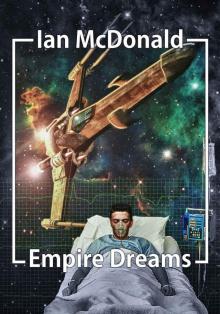 Empire Dreams
Empire Dreams The Menace from Farside
The Menace from Farside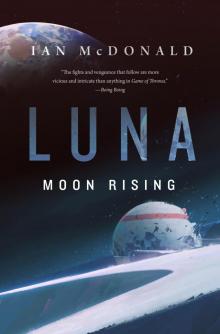 Luna: Moon Rising
Luna: Moon Rising Moon Rising
Moon Rising Desolation Road dru-1
Desolation Road dru-1 Empress of the Sun
Empress of the Sun Ares Express dru-2
Ares Express dru-2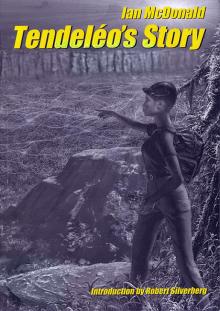 Tendeléo’s Story
Tendeléo’s Story River Of Gods
River Of Gods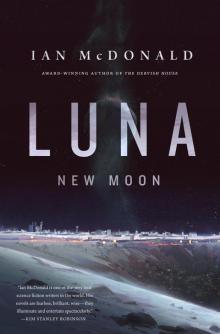 Luna
Luna![Cyberabad Days - [River of Gods 02] Read online](http://i1.bookreadfree.com/i1/03/29/cyberabad_days_-_river_of_gods_02_preview.jpg) Cyberabad Days - [River of Gods 02]
Cyberabad Days - [River of Gods 02]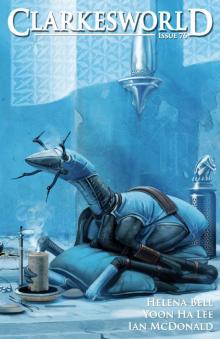 Clarkesworld Magazine Issue 76
Clarkesworld Magazine Issue 76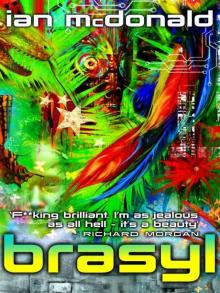 Brasyl (GollanczF.)
Brasyl (GollanczF.)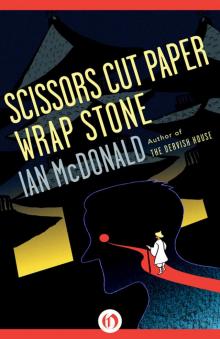 Scissors Cut Paper Wrap Stone
Scissors Cut Paper Wrap Stone Chaga
Chaga Time Was
Time Was Cyberabad Days
Cyberabad Days Be My Enemy
Be My Enemy Changa
Changa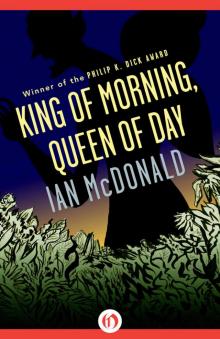 King of Morning, Queen of Day
King of Morning, Queen of Day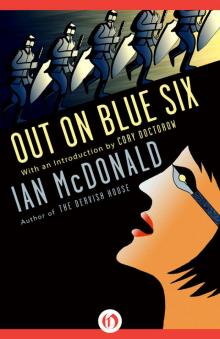 Out on Blue Six
Out on Blue Six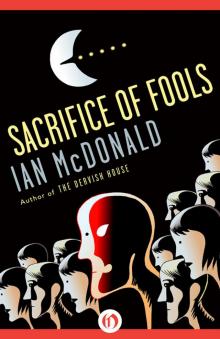 Sacrifice of Fools
Sacrifice of Fools Desolation Road
Desolation Road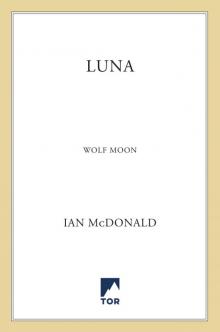 Luna--Wolf Moon--A Novel
Luna--Wolf Moon--A Novel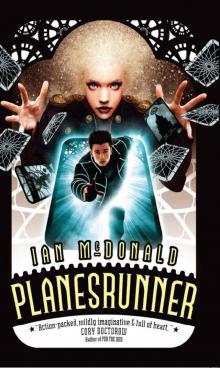 Planesrunner (Everness Book One)
Planesrunner (Everness Book One) Ares Express
Ares Express